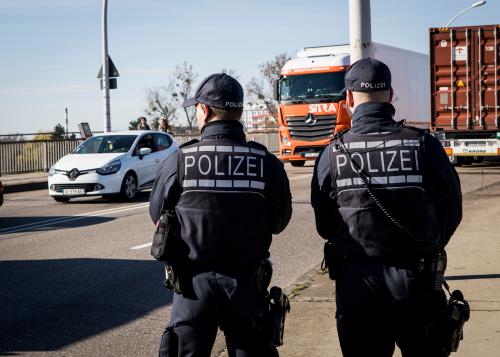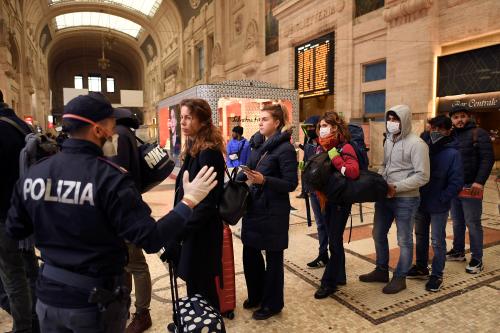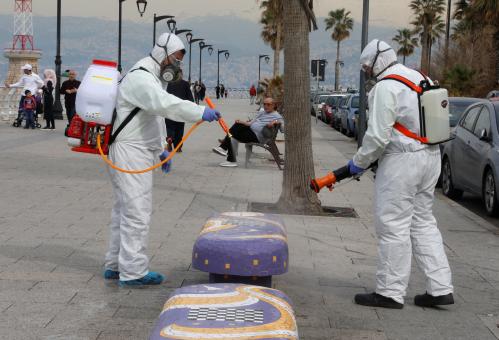Among the many things affected by COVID-19 is the electoral process. As Americans debate the wisdom of continuing primary contests for the Democratic presidential nominee, European leaders are struggling with scheduled local, regional, parliamentary, and presidential elections. Thus far, most countries have erred on the side of caution.
France (Local elections, March 15 and 22): France held local elections on March 15. When French President Emmanuel Macron decided to proceed on March 12, the country was at a lower level of crisis response. By March 14, France had entered “stage 3” and introduced significant restrictions (e.g., closure of non-essential shops and schools, bans on gatherings of over 100 people, and cancellation of major sporting events). At the polls, the government asked voters to stay three feet apart and bring their own pens. Voter turnout was historically low, dropping from 63% in 2014 local polls to 45% on Sunday. In his address the following day, Macron announced a delay in the second round that, by law, was scheduled for a week later. Given the escalating spread of the virus, all parties agreed with the decision. The government will ask parliament to extend the current mandates of mayors and council members. It plans to postpone the second round by at least six weeks; scientific advisors will make a recommendation by mid-May on whether elections could be held in mid-June. The first-round results are expected to hold.
Germany (Regional elections, March 15): Germany’s southern region of Bavaria, the second most affected part of the country, also held elections on March 15. Chancellor Angela Merkel did not announce nation-wide “radical measures” (e.g., closure of non-essential shops and schools, restrictions on restaurants, and border closures) until the following day. Election workers wore gloves, and voters were allowed to bring their own pens. Turnout was higher than the last election six years ago, though officials noted a greater number of postal ballots this time. The results led to an unusually high number of run-offs, which are required when no candidate received over 50% of the vote. These will be conducted by postal ballot.
Italy (Referendum, March 29; Regional elections, April 19 and May 31): Italy planned to hold a constitutional referendum on March 29, asking voters whether to reduce the number of members of parliament. Given the seriousness of the outbreak in Italy, the Ministry of Interior announced on March 5 the postponement of this vote. It did not specify a new date. In addition, Italy was scheduled to hold elections in 9 of its 20 regions in 2020. Elections were held in Emilia-Romagna and Calabria on January 26. Polls are still scheduled in Aosta Valley on April 19, and in Campania, Liguria, Marche, Apulia, Tuscany, and Veneto on May 31. The government is expected to postpone these elections, with media reports suggesting a 90-day delay; however, there has not yet been an official announcement.
Spain (Regional elections, April 5): On March 16, regional leaders in Spain’s Basque Country (where the COVID-19 outbreak has been significant) and Galicia announced the postponement of elections scheduled for April 5. These decisions were made in consultation with other party leaders. A new date has not been set.
North Macedonia (Parliamentary elections, April 12): On March 17, political party leaders in North Macedonia announced the postponement of parliamentary elections scheduled for April 12. Party leaders will hold further consultations on the implementation of this decision, including the timing of new polls. The vote will test public support for the pro-European approach of incumbent Prime Minister Zoran Zaev, particularly after Macron’s decision to block the start of EU accession talks last fall.
Serbia (Parliamentary elections, April 26): On March 16, the Serbian government announced the postponement of parliamentary elections scheduled for April 26. The previous day, the government had announced a state of emergency. In addition to the standard closures of non-essential businesses, the military is guarding hospitals and police are monitoring quarantined people. The polls will be held after this decree is lifted. Most opposition parties already planned to boycott the elections, accusing President Aleksandar Vucic of corruption, stifling media freedom, and attacking opposition activists.
Northern Cyprus (Leadership elections, April 29): The “Turkish Republic of Northern Cyprus,” which is only recognized as a country by Turkey, was scheduled to hold elections for the leader of the Turkish Cypriot community on April 29. There was consensus among political parties to postpone those polls for six months. Following a positive meeting between the leaders of the Greek Cypriot and Turkish Cypriot communities last November, there was the prospect of resuming negotiations on the island’s reunification after these elections. Talks seem unlikely in the near term, as leaders in Cyprus as well as Turkey and Greece are focused on coronavirus.
United Kingdom (Local elections, May 7): England was scheduled to hold local and mayoral elections on May 7. Despite criticism of its sluggish response to stemming the spread of coronavirus, the British government was the first in Europe to cancel polls. On March 13, it announced a one-year delay. Opposition parties supported the postponement, although the Liberal Democrats challenged the government’s decision to wait a year rather than until autumn per the Electoral Commission’s recommendation.
Poland (Presidential election, May 10): Poland does not currently plan to postpone the presidential elections scheduled for May 10. Some opposition parties have called for a delay, citing the government’s decision to close schools and shops as well as restrict gatherings of over 50 people. According to opinion polls, the governing nationalist incumbent Andrzej Duda is likely to win the first round; he would likely face tough competition in a second round, which would be held on May 24 if he failed to win more than 50% support. Duda is allied with the ruling Law and Justice Party; a loss could hinder the party’s plans to continue reforming the judiciary, which has raised concerns about the country’s adherence to the EU’s rule of law standards.
Looking ahead: Other European elections on the horizon are in Iceland (presidential election, June), Belarus (presidential election, August), and France (senate elections, September). In October, there are scheduled polls in Austria, Bosnia, the Czech Republic, Georgia, Lithuania, Moldova, Montenegro, and Ukraine.
Political parties and the electorate understand the rationale for postponing elections during the coronavirus pandemic, especially given the importance of social distancing to reduce the spread of the disease. All governments, including those whose mandates have been extended, are primarily focused on emergency management at this time. Yet given the serious political issues at stake in many of these countries, there will be pressure for polls to be rescheduled as soon as practically possible.
The Brookings Institution is committed to quality, independence, and impact.
We are supported by a diverse array of funders. In line with our values and policies, each Brookings publication represents the sole views of its author(s).









Commentary
European elections in a time of coronavirus
March 20, 2020